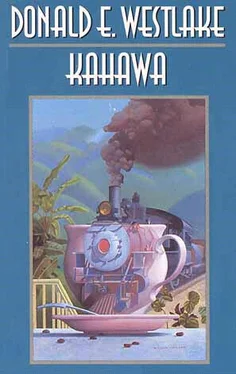Stopping beyond the tracks, facing this way, chrome glittering painfully, was a gleaming dark-blue Mercedes-Benz 300 sedan, the vehicle of choice of the native-born winners in this part of the world. The chauffeur, capped and jacketed in black, half his face hidden behind huge dark sunglasses, sat stolid and unmoving at the wheel, dreaming perhaps of his own Mercedes and chauffeur farther down the road of the future. Behind him, the passenger or passengers were obscured in darkness; possibly a government official, or a successful contractor with government connections, or an even more successful smuggler, or an elaborately coiffed woman belonging to one of the above. (Given that many of the central African tribal names featured the formal “Wa” plural prefix—Wakamba, Wa-Kwavi, Wateita, Wa-Nyika, even Wa-Kikuyu—and given these winners’ invariable symbol of triumph in the Mercedes-Benz, the natives used an ironic tribal name for these detribalized successes: the Wa-Benzi. It was a deadly insult to call a Wa-Benzi that to his face. Not that he’d attack you with a knife or his fists; no, he’d wait and destroy you later, in some indirect white man’s way.)
The train, when it at last appeared, was a freight, very slow-moving, pulled by a Garratt steam locomotive. Beyond the trundling freight cars, Kisumu hunkered in the hot sun, a seedy, sand-colored, low-lying commercial town, as ugly and as functional as a prison outhouse, a scruffy equatorial port like dozens of others around the world’s waist, except that instead of facing an ocean it faced a lake, Victoria, the world’s second largest, the size of Scotland, the source of the Nile, girdled by Uganda and Kenya and Tanzania. Serviced by the railroad from the east and by any number of freight boats from the west, Kisumu was the conduit for an awful lot of wealth, absolutely none of which showed.
As the rusty green caboose at last slid by, and the barriers began to lift, Charlie abruptly uncoiled himself out of his seat and out of the Land-Rover, saying, “Good-bye.”
“Good-bye?” Frank watched with chronic irritation as Charlie sauntered away southward along the tracks, taking his own unfathomable direction. His shirt had once been white. His trousers, baggy-assed and too big in the waist and cut off now just below the knee, had once been black and probably the property of some up-country missionary or mortician. His legs, splaying out when he walked, looked as though they were full of doorknobs. “The thing I’d like to know,” Frank said aloud—he’d been talking to himself for several years now, and as yet had found no cause to disagree nor end the conversation—“is why, if he wasn’t going across the track, he sat in this bloody car for ten minutes until the train went by.”
There was no answer. There was never an answer with Charlie. Frank shook his head, and the car behind him honked in impatience as the Mercedes-Benz came by. In the backseat were two Wa-Benzi, serious self-important men in suits and ties, discussing white papers in an ecru manila envelope. Frank wrestled the Land-Rover’s gearshift into first, stomped the accelerator, and jolted across the railroad track.
* * *
The heart of Mr. Balim’s enterprises, now that his holdings in Kampala and Luzira had been confiscated by Idi Amin, was a pair of long, low, rambling, concrete-block, stucco-faced buildings on Kisiani Street. They contained storefronts, offices, and warehouse space, as well as a broad yard area in the rear, and one and a half of them were colored a faded patchy blue, using paint Mr. Balim had once brokered but not been paid for. The paint had run out, leaving the right side and rear of one of the buildings the normal Kisumu color of pale sun-washed tan.
Fighting the wheel with both hands and both knees, Frank steered the Land-Rover through a tight turn into the narrow driveway between the two buildings. The side walls bore the scars of his earlier moments of impatience, but this time as it happened he hit nothing, and continued on to slam the vehicle into its normal parking space by the electrified fence at the rear of the property.
Walking toward the right-hand building, the one containing the offices, Frank passed two overall-clad employees hunkered by a rusty outboard motor, pointing at it with oilcans and screwdrivers and muttering together in Luo. Off to the left, another employee enthusiastically changed a truck tire with the assistance of a sledgehammer. Another pair of employees sprawled at their ease against the rear wall, awaiting the emergency best suited to their talents. Frank tried to spit into the sand to express his feelings about all these people, but his mouth was too dry; he contented himself with a disgusted look and went on inside.
Isaac Otera, at his desk in Balim’s outer office, also looked disgusted, and was speaking with weary patience to somebody on the phone. “We have a policy about that,” he said, obviously not for the first time. “We do not pay for goods we have never seen.” Frank, with a small wave, started to walk on through to Balim’s office, but Isaac waggled his hand in negative fashion while he kept explaining to the phone.
No? Frank looked at the closed door; was Balim in there with someone else? He couldn’t ask Isaac until the phone call was done, so he went out again to the soft-drink machine in the hall and bought two 7UPs. One he poured on his head; the other he drank. Then he went back and sat on the bench opposite Isaac and rubbed his nose with the back of his hand; it tickled after the 7UP.
Isaac must be dealing with somebody in the government; otherwise, he wouldn’t be putting up with it this long. But that was all right; being patient with government officials was what Isaac had been born for.
Like Balim himself, Isaac Otera was a refugee Ugandan. A member of the Langi tribe from the northern part of the country, he had been well educated at Makerere University and had started in government service with the Uganda Land Commission some twelve years ago, at the age of twenty-two. He was a natural Wa-Benzi, a tall and handsome, intelligent and educated man with a respectful liking for Northern culture, and in a rational world he would still be what he had been three years ago: some sort of assistant undersecretary somewhere in the bureaucracy, not yet the possessor of a Mercedes, but at least owning a Ford Cortina.
But Idi Amin’s Uganda was the reverse of a rational world. The Langi were one of the two tribes Amin hated most, and against whom he had assembled death lists thousands of names long. Three years ago, driving homeward toward Kampala one evening after an unexpectedly long conference in Jinja, Isaac had had a blowout in the Ford Cortina. With some difficulty he had found a garageman to help him with the repairs, and a phone to call home to tell his wife and two daughters that he’d be late. He hadn’t been alarmed when there was no answer, since phone service was chancy at best and he’d assumed their phone was out of order. When finally he’d reached home, three hours late, the lights were all on but the house was apparently empty. Isaac had walked through the rooms, calling their names, until he’d seen the smear of blood on the basement doorknob. It had not been possible for him to touch that doorknob, to open the door and see what lay behind it. Taking what money he could find, and two sweaters, he had gone out into the fields behind the house and waited. Sometime after midnight two cars had stopped outside and several men had emerged to enter the house through both the front and rear doors. After a while, a lot of shooting had sounded from in there: machine-gun fire and pistol shots. Several of the lamps were shot out. Then the men had driven away again, leaving the remaining lights burning, and Isaac had crept off, making his way to the house of a friend, who had driven him before dawn to Tororo and the Kenyan border.
Читать дальше












